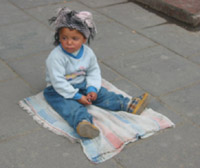
Street Children – Our Concern
The problem of street children is still unsolved in Georgia. Nobody cares about them, and, their numbers are not known. Many street children are drug addicts and have trouble communicating. Instead of helping them, police only sets “rates” for them to beg in certain areas. Why isn’t the Georgian government trying to help them? They are human beings, and part of our society.
Everyday, the number of street children in Georgia grows larger. Most have no documents proving their identities, meaning that officially, the person does not exist. If something happens to them, the state will be unable to help. If murder is committed, the general prosecution office cannot investigate if the victim has not been officially registered.
Many street children work in markets and in other busy areas. Some are employed in small enterprises. Saying the children are “employed” is perhaps misleading. They do not sign any type of work agreement, so employers can treat them as they see fit. Many of these children are homeless and addicted to drugs. They spend nights in underground stations, which costs them some money, often 5 GEL or more. To whom do they pay? To the police and to the underground administration. The daily income of street children is estimated to be, on average, at 10-15 GEL. Police salaries are also very small, but this does not justify their actions. District inspectors often force street children to share their income. If a child refuses to share their income with the inspector, he is often detained, and must bribe his way out of custody.
Such situations place enormous stress upon these children. They often become sexually active at an early age. Eventually, they may look 40 while still in their mid-20’s. Many children we met in the street have parents, and used to go to school. What is the main reason for the problem that children do not go to school and rush to the street?
David Tsikarishvili, head of legal services for the Trade Union “Ertoba” commented, “The best way to help children avoid exploitation is to improve the educational system. In a class consisting of 45 pupils, a child is unable to distinguish himself. A teacher can’t work with a child individually. Education is only compulsory until the 6th form, and at the age of 12, many children leave school. Since a person may only legally begin to work at age 15, what do children do from ages 12 to 15? Frequently, these children go into the street. Legislation should not allow for such a gap.”
Tsikqarishvili continues, “Street children frequently become criminals. Many become drug addicts and become uncommunicative. By this, I mean that they won’t develop social habits or practice communicating with average citizens in society. In some ways, the law protects children from their parents, but it doesn’t force parents to make sure their children receive a proper education. Unfortunately, the state also fails to ensure that children are properly educated.”
A child’s future often depends on the mood of their parents, which can lead to deplorable results. After work, parents are often too tired to help children do homework, or to listen to their problems. Children raised without adequate parental care often try to satisfy these needs in the street.
It’s necessary to take action as soon as possible. Otherwise, our streets will be full of children in no time.
by Tskriala Shermadini and Nana Naskidashvili



